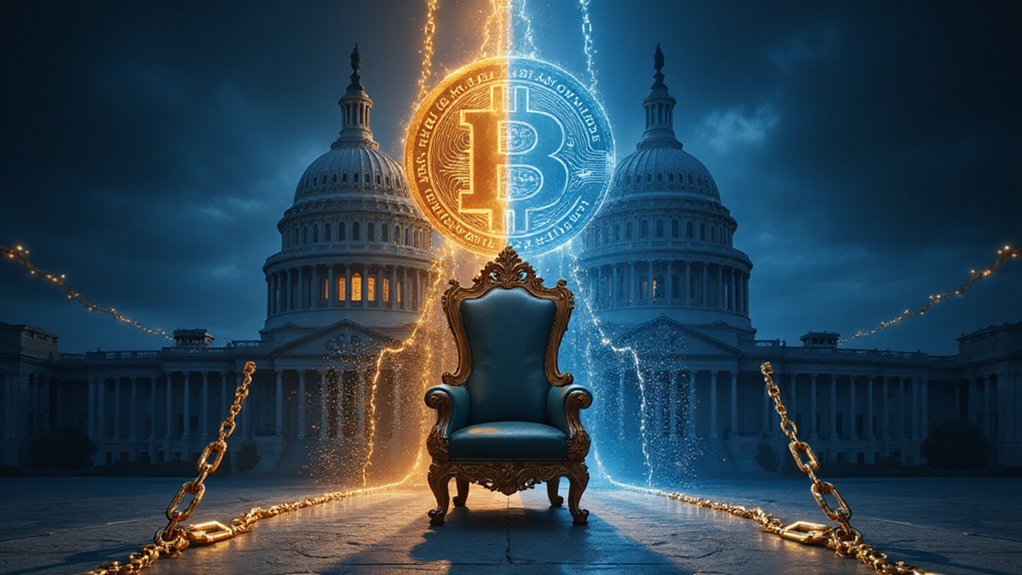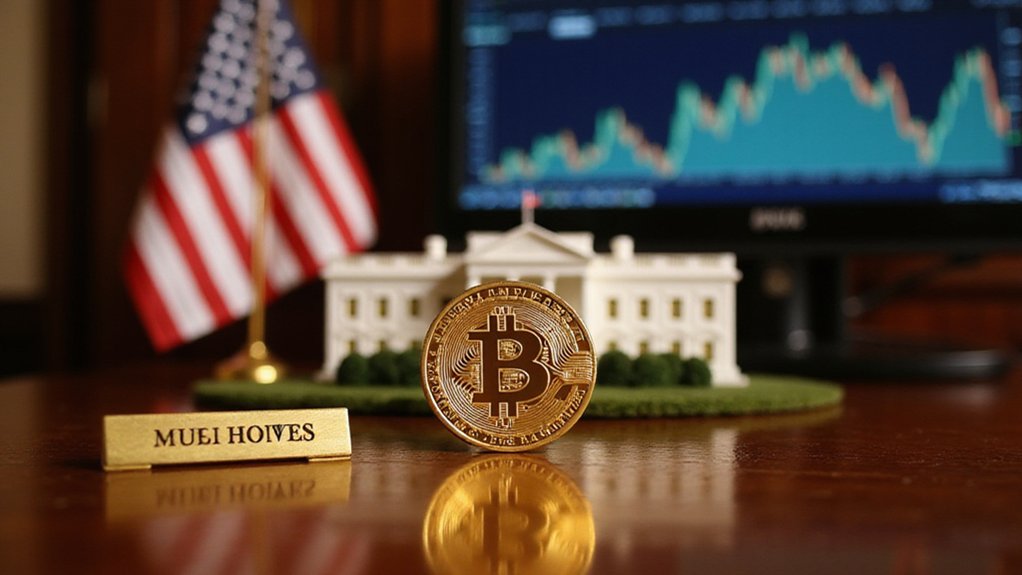David Sacks, Trump’s appointed Crypto and AI Czar, will lead regulatory reform by chairing the President’s Working Group on Digital Asset Markets. His mandate encompasses developing a legal framework for cryptocurrency while creating a permissive regulatory environment. The appointment—ironically transforming a once anti-establishment technology into a government-sanctioned asset class—has already impacted markets, with Bitcoin surging to nearly $95,500 post-announcement. The proposed Strategic Bitcoin Reserve represents just one initiative in this administration’s broader cryptocurrency ambitions.

The irony that cryptocurrency, once the rebellious alternative to traditional finance, now seeks governmental blessing is apparently lost on no one except, perhaps, its most ardent libertarian proponents. Donald Trump’s appointment of David Sacks as “Crypto and AI Czar” represents the ultimate establishment embrace of a technology that initially promised to circumvent centralized authority altogether.
Sacks, a long-time industry supporter, now chairs the President’s Working Group on Digital Asset Markets with a mandate to develop a thorough legal framework enabling the crypto sector to flourish domestically.
His direct advisory role to the President positions him as the administration’s primary architect of what promises to be a more permissive regulatory environment—a stark departure from previous approaches that left the industry in a perpetual state of compliance uncertainty.
The appointment follows an executive order establishing a crypto-focused working group that aims to advance policy development and regulatory clarity.
Among Sacks’ most ambitious initiatives is the proposed Strategic Bitcoin Reserve, fundamentally a government-sanctioned digital asset stockpile intended to bolster American economic interests in the emerging crypto economy. This initiative would treat Bitcoin as digital bullion similar to how the government maintains gold reserves, utilizing forfeited holdings rather than taxpayer funds. This aligns with the administration’s promise to position the United States as the crypto capital of the world.
Critics, however, raise legitimate concerns about potential conflicts of interest and whether the forthcoming regulatory reforms might disproportionately benefit wealthy investors while leaving retail participants exposed to market volatility.
The selective enforcement of existing regulations presents another potential pitfall in an industry notorious for its boom-bust cycles.
Bitcoin’s dramatic price increase to nearly $95,500 USD following Sacks’ appointment demonstrates the market’s positive response to the administration’s pro-crypto stance.
Collaboration with the SEC’s Crypto 2.0 task force will likely define the administration’s approach to market oversight, though questions remain about how Sacks will balance innovation with necessary consumer protections.
His leadership faces the additional challenge of cryptocurrency’s inherent price volatility—a feature that complicates its integration into traditional financial systems.
As the administration’s point person on crypto policy, Sacks shoulders the considerable responsibility of transforming an industry that has operated largely in regulatory shadows into one with clear guidelines, potentially reshaping America’s position in the global digital asset landscape for decades to come.
Frequently Asked Questions
How Will Crypto Taxes Change Under Trump’s Administration?
Trump’s administration signals significant crypto tax reforms, with DeFi platforms now exempt from transaction reporting requirements after H.J.Res.25’s passage.
Capital gains exemptions for US-based cryptocurrencies appear imminent, though specifics remain nebulous.
Form 1099-DA implementation will create wallet-specific reporting burdens starting 2025, while proposed “Made in America” ETFs could receive preferential tax treatment.
The regulatory pendulum swings decidedly toward easing compliance obligations, though investors should prepare for inevitable implementation hiccups as these policies materialize.
What Specific Cryptocurrency Projects Does Trump Personally Support?
Trump has publicly endorsed Bitcoin and expressed support for the Official Trump Token (TRUMP), which received a notable $20M investment from Freight Technologies.
While not explicitly naming other specific cryptocurrency projects, his executive orders and statements signal broad support for stablecoin development, particularly frameworks aligned with Senator Hagerty’s legislation.
His family’s ventures reportedly include blockchain infrastructure projects connected to a $2B Emirati-backed investment—though the particulars remain characteristically opaque despite their potential significance.
Will Trump Create a Dedicated Crypto Regulatory Agency?
Based on the administration’s announced plans, Trump does not intend to create a dedicated crypto regulatory agency.
Rather, the strategy pivots toward leveraging existing regulatory infrastructure—with the CFTC slated for expanded jurisdiction over cryptocurrency commodities and the SEC maintaining oversight of tokenized securities.
This approach, orchestrated through a multi-agency Crypto Working Group chaired by David Sacks, aims to streamline regulation through established channels rather than constructing an entirely new bureaucratic apparatus.
How Might Trump’s Crypto Policies Affect Global Digital Currency Markets?
Trump’s crypto policies could substantially reshape global digital currency markets through several mechanisms.
The establishment of a Strategic Bitcoin Reserve might stabilize Bitcoin prices while signaling institutional legitimacy.
Regulatory clarity—a stark departure from the current patchwork approach—would likely attract international investment and potentially trigger competitive responses from other nations.
The combination of centralized oversight with market-friendly policies could position the U.S. as a crypto hegemon, though heightened government involvement paradoxically introduces new forms of market volatility.
Can Trump’s Crypto Czar Override Existing SEC Regulations?
No, Trump’s crypto czar cannot directly override existing SEC regulations.
David Sacks, despite his influential role, lacks unilateral authority to nullify established securities frameworks.
Rather, his position enables him to shape policy direction through the President’s Working Group on Digital Asset Markets, potentially influencing regulatory evolution through collaborative efforts with relevant agencies.
Any substantial changes to SEC oversight would require formal rulemaking processes, legislative action, or court challenges—not merely executive pronouncement.









